- Home
- James A. Michener
The Source: A Novel Page 12
The Source: A Novel Read online
Page 12
The boy sat with his mother in the sunlight pondering these matters when a bee eater flew past, creating brilliance in the sky, then disappearing among the cypress trees which stood like warning sentinels. A tantalizing thought played across the boy’s mind, a thought not easy to formulate but one that he could not throw aside. A trio of crested larks marched past, pecking for fallen grains, and after they disappeared he stared at the cypresses and asked, “Suppose the spirit that forms the beautiful cone is not within the cypress? Suppose the rain comes or stays away not because of what the rain wants to do …” His thoughts were leading him into areas too vague and shadowy for him to explore, and for the moment he dropped the matter, but the fear he had aroused would not go away.
It would not be correct to say that with the discovery of cultivated wheat fear was also discovered, for ordinary fear the Family of Ur had long known. When Ur came upon a cornered boar or a lion from the north he knew fear. And when a woman in the cave was about to give birth Ur’s wife knew fear, for she had seen women die at such moments. And one mournful night when Ur had lost a hunter in the swamps, killed by a boar, his daughter had heard the messenger’s cry from afar, “He is dead!” and she had thought it was Ur himself. Even she knew fear. But the fear which the family was now discovering was of another kind: it sprang from the slow-maturing apprehension regarding the relationship of man to his world, the gnawing suspicion that perhaps things were not so simple as they seemed on this average autumn day when ripening grain hid in the stalks and a rumor of deer echoed in the forest. Again and again the glorious bee eater flashed through the wadi, driving the mother and son to wonder whether it had been dispatched by some outside power as an exquisite messenger to warn men that the same force which endangered the bees was ready to swoop down on fields and houses.
And then one morning, as the grain approached its harvesting, Ur cried suddenly, “That’s it!”
“What?” his wife asked, looking at him suspiciously.
“We’ve been trapped into putting all our energy into wheat.”
“What do you mean, trapped?” she asked, caught by an ugly suspicion that Ur had discovered her own source of fear.
“When we have all the grain in one place, it can easily be destroyed.”
“You mean the sun? The fire?”
“Those, or the wild boar rooting up the fields.”
She looked at her husband with unashamed fear, for Ur was an authority, a sensible hunter and a man whom others respected. Therefore he must be listened to. What was more, he had dared to express in words the growing fear that she and her son had experienced, for it was a rule of life that the Family of Ur was discovering: the more committed a family becomes to a given project, the more vulnerable it also becomes. Having partially conquered nature, they were now a prey to it. “What can we do?” she asked quietly.
Ur’s son was at this moment watching the iridescent bee catcher dart among the cypresses for his prey, and he observed, “If we knew some way to make the rain and sun appreciate our problem.” But the family could think of no way to accomplish this, and late that afternoon they discovered that their enemy might lie in other directions than the ones they feared, for a towering storm brewed over the Carmel and moved north accompanied by flashes of lightning and the roar of thunder. Drops of rain fell in the dust and splattered like broken bowls of broth across the flat rock. Others followed, and soon a slanting wall of water was dropping from the sky, filling the wadi and sending a yellow flood swirling among the trees.
“It’s reaching for the house!” Ur shouted, and he saw that if the deluge continued, his wife’s fields must be swept away.
“The storm fights us for having stolen the wild wheat,” his wife wailed as the turbulent flood sent its fingers into her fields.
Ur was no more willing to surrender to the flood than he would have been to flee a lion. Running to the house he grabbed his best spear and with it rushed to the edge of the wadi, a bandy-legged old man ready to fight the elements. “Go back!” he roared at the raging storm, not knowing exactly where to throw his spear. Always before, when floods came, he had retired to the cave to wait out their subsidence, but now that his home was in the middle of the storm he was involved and there was no retreat, no refuge. “Go back!” he roared again.
But his son saw that if the rain stopped falling in time, say, within the next few moments, he might by building a dike hold back the wadi and prevent it from washing away the fields. Accordingly, he began running about placing rocks and sticks and mud along the lower portions of his land, diverting the water. Summoning his family he showed them what to do. And when Ur finally saw what might be accomplished, he laid aside his spear, stopped bellowing and speeded the construction of the dike. The girl called others from the cave, and as the thunder crashed about the trees above them, all worked to build a wall to hold back the muddy water, and it was obvious that the fields would be saved if only the storm would halt.
In these critical moments, when the fall of rain was greatest, obscuring even the mouth of the cave, Ur saw his wife standing in the storm, her tired face uplifted, crying, “Storm, go back! Go back and leave our fields!” And whether the spirit of the storm heard or not, no one could later say, but it abated and the waters receded.
When the storm was gone Ur sat bewildered on a rock, marveling at how close the flood had come to destroying his home and at his son’s dexterity in building the dike. Then, out of the corner of his eye, he saw his wife doing a most perplexing thing. “Wife,” he shouted, “what are you doing?” And as she threw handfuls of wheat into the swirling waters she explained in a low voice, “If the storm has left us our wheat, the least we can do is offer him some in thanks.”
It was an epochal event, this utterance of the word him. For the first time a human being at the well of Makor had spoken of an immanent spirit as “he,” a personified being who could be approached directly on a woman-to-deity basis. This was the inchoate beginning of the concept that a human-like deity could be propitiated and argued with on a personal basis. Throwing her arms wide she tossed her last grains on the water and cried, “We are thankful you went away,” and the storm sighed as it roamed overhead, whispering to her in reply. This was the first fumbling effort to evoke the I-You relationship—“I am begging You, my partner, for mercy”—under which society would henceforth live, until the multitude of gods would become more real than sentient human beings.
When Ur saw how the planned fields could be protected from floods, and how they could be depended upon to provide an abundance of grain for all, he was gradually lured away from hunting, as his wife had foreseen he must be. He began to speak of “my fields” and of “my house,” and his feelings toward each were different from those he had entertained about the cave. That reassuring hole beneath the great rock had not been owned by him nor by anybody; no one had built it nor improved it; he merely shared a portion of it for as long as he could bring in more food than he ate. With the new house it was different. It was his house, not his brothers’ who lived in the cave. The fields were his, too, for he had cleared them. And at the height of the storm he had been ready to fight the wadi and the sky to retain them. In his new apotheosis as owner Ur began to bring new fields into cultivation, but the word fields could be misleading. For Ur a field was an area no larger than a table, at its maximum as large as several tables placed together. Men of the Family of Ur had always possessed an intuitive sense of the land, and now it was the reluctant farmer who discovered one of the essential mysteries of earth on which all subsequent agriculture would depend: he found that if he continued to plant his wheat in one field near the edge of the sloping rock it would grow better because the grains would be assured drainage from the rock, but soon the earth would tire of nurturing the seed and after a time would halt maliciously and send forth only sickly wheat; but if he planted his grains in some spot lower down on the sides of the wadi, where the rain was free to wash down, bringing with it each year bits of new ear
th to add to the old, the soil would be replenished and such a field could be used season after season. So in an age when fertilizer was unknown Ur had stumbled upon the flooding-principle that would later operate along the Nile and the Euphrates: allow the rivers to overflow and bring fresh soil to rebuild the old. Ur could not formulate this theory in words, but his inherited sense of earth assured him that somehow the soil was pleased with this replenishment, so he hacked out his little fields, keeping to the lower levels where fresh silt could filter down cycle after cycle. Fortified with this secret of how to keep his land fertile, Ur was tied ever more strongly to that land.
As Ur was thus tricked into neglecting hunting in favor of tending fields, he experienced a vague displeasure over the fact that his son showed no desire to take his place in the woods. “A boy like you ought to know how to kill a lion,” Ur said sharply one day. “Otherwise how can you expect to find a woman?” Once or twice, lately, Ur had suspected that his son might lack courage, for the boy inclined toward working the fields or chipping flints into new patterns. Yet Ur did remember that at the height of the storm it had been the boy who had fought the flood, and the old man admitted grudgingly, “He’s neither stupid nor lazy.”
Ur did not know it, but his malaise stemmed not from any disappointment in his son, but from the crushing impact of a new way of life that seemed to bear down on him alone: he was a hunter required to tend grain, a man instinctively of the cave forced to live in a house; he was a man who had developed a pragmatic adjustment to nature but who was now being lured into the first steps toward polytheism; but most of all he was a man who had been a happy, indistinct member of a group living in a cave, and now he was asked to be Ur, one man standing by himself, who knew how to track lions in an age when lions were beginning to move inland.
One morning, in the third year of this metamorphosis, he burst out of his new house as if the atmosphere were crushing down on him. He ran up the path, past the entrance to the cave and on up to the great rock, where he went to the highest point and stood breathing rapidly as if it was air he needed. When his lungs were full and he found that he had gained no relief, he sat down in a kind of terror. “What’s happening?” he asked, and in this moment when the possibility of death first became a reality he happened to see his daughter working in the fields, and he began to find in her the solace he did not find in his son.
At fourteen she was an attractive woman with long brown legs and a graceful neck which she adorned with jewelry made of shells and stone beads. She was ripe for motherhood and the responsibilities of a home, but she also retained the lively interests of her childhood and thus occupied a hesitant, uncertain place by the well. As a near-adult she worked with her mother, learning what she could of tanning leather and sewing, and like her family was in close contact with the manifestations of nature. She, too, felt that there must be ways to appease the unseen spirits. Ur, watching her, felt pride in her attainments and knew her to be the kind of woman who would make a round hut a warm and pleasant place, while her vital body promised many children. But it was primarily as a child that the girl impressed her elders most.
In one of the trees near the well a family of singing birds had its nest, and the Family of Ur used to take much pleasure in watching the parent birds hustling back and forth to feed their young. The adults had black heads, gray bodies and a smart dash of yellow under the tail, so that they were easy to see as they foraged for insects along the edges of the wheat fields. They sang beautifully and were charming birds to have at one’s door, except that when their four babies were partly grown they detected that one had a defective leg, and in the manner of birds they put their two bills under the weakling and with an upward toss threw him from the nest. He half flew, half fell to the ground, where he would shortly have died had not Ur’s daughter seen him fall and run to rescue him. In the following weeks she nursed the foundling to health, and although he continued to have one weak leg he became a robust little creature, hopping about the well and across the large flat rock where the girl sometimes lay watching the sky. In time he began to sing and would often fly far to catch insects, but always he came back to the round hut, perching on the shoulder of his mistress, biting at her beads and chirping in her ear. Ur was pleased with the bird, for he properly sensed that it had been sent as some kind of assurance that the birds of the forest were not angry with the people at the well for having left the cave to start a new form of life; and the girl loved the delightful bird as the last symbol of her childhood and a premonition of the more serious years ahead. Once as Ur watched the two and saw the warm affection the bird had for his daughter, hopping after her on his one good leg and using the other as a balance, he threw his arms about the girl and cried for no apparent reason, “Soon you’ll have real babies of your own. I’ll find a man.” Shortly after he said this a flight of the black-headed birds came up the wadi, and among them was a female, dark and lively, and never again did the Family of Ur see their friend.
At the far end of the wadi there lived a family of wild dogs—pariah dogs they would be called later—smaller than hyenas but larger than coyotes, and they lived by killing weakened deer or foraging at the edges of human settlements. They were powerful animals, real beasts of the forest, and occasionally an old man left aside to die would be attacked by them. When they first surged at the useless man he might think they were wolves come down from the north, but if he were brave he could drive them off and live a little longer, for they were not wolves, nor even of that breed. They were dogs; and although in their wild state they did not know it, they were capable of great friendship for the men they fought; and the men, equally blind, could not foresee that they required the dogs in order to initiate any kind of herding process, for without intelligent dogs no man could keep his more stupid animals like cows and goats under control. But all this was thousands of years in the future; for the present the two creatures—man and dog—shared the same wadi without anticipating the rewarding partnership that lay in store for them.
It was the daughter of Ur, hungry over the loss of her singing bird, inchoately hungry for the babies she had not yet had, who first noticed the great dog, largest of his pack, who volunteered to come away from the depths of the wadi and to approach the plantation in search of scraps. When Ur shied a rock at him he snarled and withdrew like the other dogs, but he did not stay away. And then one day as Ur’s daughter lay on the high place of the rock looking at the flying clouds, she became aware that the large dog was watching her, unprotected by any tree but simply standing at the far edge of the rock. The two were about a hundred yards apart, each staring at the other, when Ur, working below, looked up to see the wild animal menacing his child, and he threw a well-aimed rock which struck the beast in the right flank and drove it howling into the woods. Ur scrambled up the side of the wadi and ran to rescue his daughter. “Are you hurt?” he shouted, but when he came to her side she was crying.
It was some days before the large dog ventured back to the rock, but when he did so he found waiting for him a chunk of boar meat, which he ate cautiously, keeping his eye on the girl. Gnawing at the bone to which the meat was attached, he watched the girl for some minutes, then retreated quietly into the woods. That night the girl told her father that he must never again throw stones at the dog, because she intended feeding him regularly at the edge of the rock; and after she had done so for some months, moving always closer to the spot where he ate, he allowed her to sit less than forty feet from where he took the meat, and she could see his powerful jaws. She could also see the dancing lights in his eyes and the manner in which he held his tail when he assumed that she would not attack him, and she was tempted to move closer and perhaps to touch him, but whenever she showed an inclination to do so, the dog moved cautiously away. In these tentative years of introduction, forty feet was the minimum distance of safety between dog and man, and so long as this was maintained, the girl and the wild dog cultivated their friendship. That the relationship was significant
to the dog, even when the girl failed to feed him, was proved one morning when, during the time that the girl sat watching the animal, she was called back down to the well. As she left abruptly, the dog seemed disappointed that she was leaving and followed her, at his distance of forty feet, until she reached the house. He then sat for a long time waiting for her to reappear. As soon as he was satisfied that she was there he left the unfamiliar terrain and ran back to the woods.
Perhaps Ur’s daughter could in time have diminished the distance between the two, for she was patient and the dog was inquisitive, but one day as she worked in the wheat fields, unmindful of the beast yet aware that he was watching her, she heard a human voice utter a cry of victory which was drowned by the piercing wail of a dog, and she dashed with passion to the rock to find that her animal—her proud, wild dog of the forest—had been slain by a spear which had passed through the chest. The dog lay inert, his brown eyes still open in sad surprise, but at the far edge of the rock stood a tall young man shouting exultantly, “I’ve killed the wild dog!” And she leaped at him with an anguish which only the bereaved can know, and began beating on him and driving him from the rock.
… THE TELL
With Vered Bar-El absent in Chicago, Cullinane was free to direct his whole attention to the job of drafting a preliminary report on the year’s campaign, but in doing so he found that any sentence he wished to use in describing how early society came into being was apt to be vague unless each word was carefully explained. The simplest phrase required qualification plus a warning that it could not have meant in the year 9000 B.C.E. what it meant today. For example, once when he was trying to describe how his imaginary family dressed, he wrote of the father, “He wore skins,” but as soon as the three words appeared before him on the paper he realized that each, to be intelligible, required special definition.

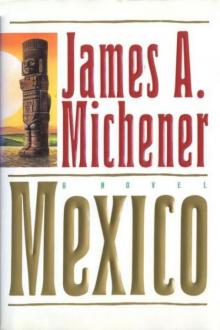 Mexico
Mexico The World Is My Home: A Memoir
The World Is My Home: A Memoir Sayonara
Sayonara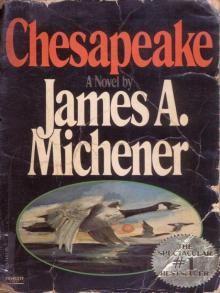 Chesapeake
Chesapeake The Novel
The Novel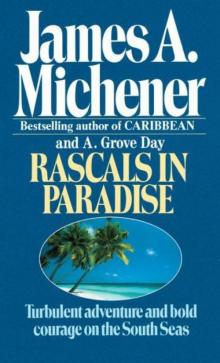 Rascals in Paradise
Rascals in Paradise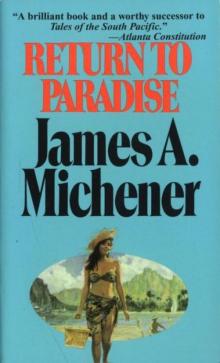 Return to Paradise
Return to Paradise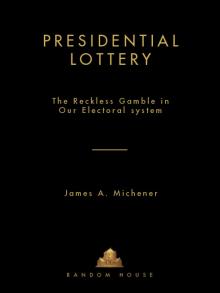 Presidential Lottery: The Reckless Gamble in Our Electoral System
Presidential Lottery: The Reckless Gamble in Our Electoral System The Source
The Source Poland
Poland Space
Space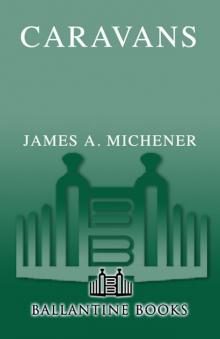 Caravans
Caravans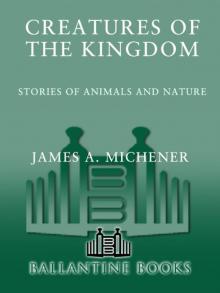 Creatures of the Kingdom: Stories of Animals and Nature
Creatures of the Kingdom: Stories of Animals and Nature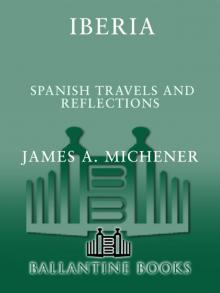 Iberia
Iberia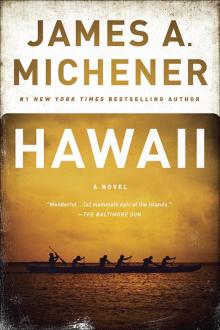 Hawaii
Hawaii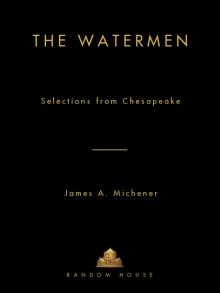 The Watermen: Selections From Chesapeake
The Watermen: Selections From Chesapeake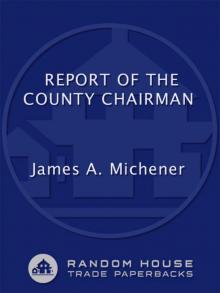 Report of the County Chairman
Report of the County Chairman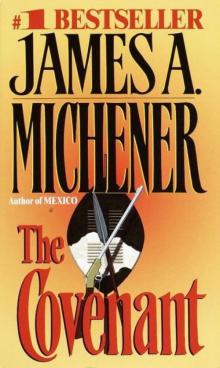 The Covenant
The Covenant The Bridges at Toko-ri
The Bridges at Toko-ri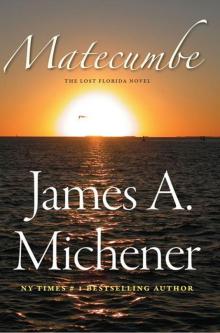 Matecumbe
Matecumbe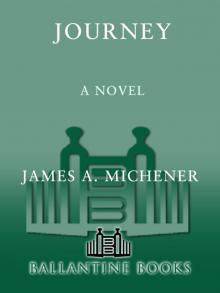 Journey: A Novel
Journey: A Novel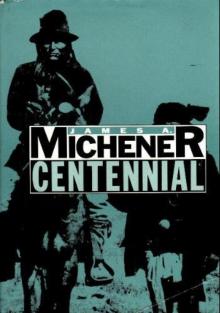 Centennial
Centennial Sports in America
Sports in America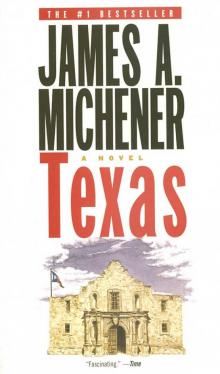 Texas
Texas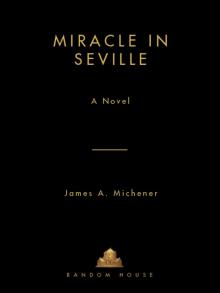 Miracle in Seville
Miracle in Seville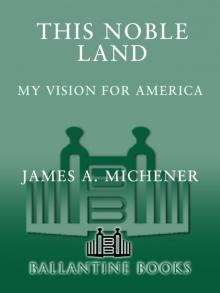 This Noble Land: My Vision for America
This Noble Land: My Vision for America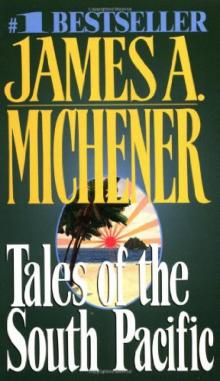 Tales of the South Pacific
Tales of the South Pacific Bridges at Toko-Ri
Bridges at Toko-Ri Space: A Novel
Space: A Novel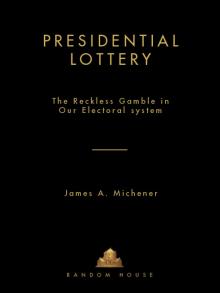 Presidential Lottery
Presidential Lottery Sayonara: A Novel
Sayonara: A Novel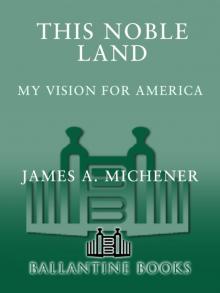 This Noble Land
This Noble Land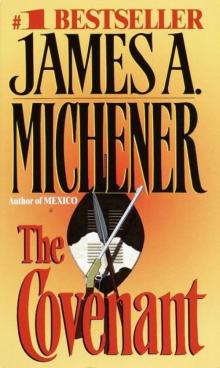 The Covenant: A Novel
The Covenant: A Novel Miracle in Seville: A Novel
Miracle in Seville: A Novel The Bridge at Andau
The Bridge at Andau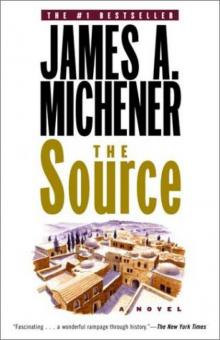 Source
Source The Source: A Novel
The Source: A Novel Journey
Journey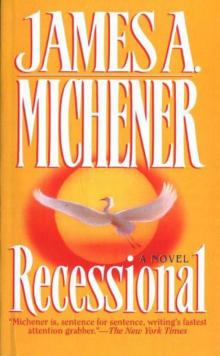 Recessional: A Novel
Recessional: A Novel Legacy: A Novel
Legacy: A Novel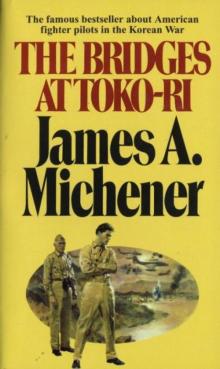 The Bridges at Toko-Ri: A Novel
The Bridges at Toko-Ri: A Novel Poland: A Novel
Poland: A Novel